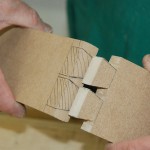Life is a succession of crises and moments when we have to rediscover who we are and what we really want. – Jean Vanier

The quote was a bit heavy, so I thought I’d lighten it up a bit. Be honest, you’ve had this crisis, or worried about it. Have you discovered who you are in a crisis, and what you want?
What does that mean?
This is an interesting quote to consider for a control freak. You want to believe that you have some control in your life, and to an extent you do. At least when things are calm.
But then come the storms. You may not know when they will occur, but you know that they will come. And like a sailor on the sea, you must simply do your best to weather the storm.
Hopefully, after the storm, we learn something about ourselves, and consider what we might do differently next time. To me, that is what the quote is saying to us.
We will be tested, and if we learn from the test, we will have the opportunity to change our path, what we want, what we are doing, and were we are headed.
Why is self-examination important?
Where would you be if you didn’t know yourself? How would you get where you wanted to go if you didn’t know how to motivate yourself? Where would you turn for help if you didn’t know your strengths and weaknesses? All these, and so much more, is available to you, if you will look within yourself.
Self-examination, especially after a big event, a crisis, or a storm, is crucial. Why did you do what you did? What might have been a better course of action? What skills would have made the event easier to handle or manage? How do you answer these questions? By self-examination, of course.
And we are always changing, sometimes in subtle manners. What then should we do to notice how things have shifted? How do we know where we need to improve? How do we find new ideas or possible destinations for our lives? If you guessed self-examination, I may be making this too easy for you.
If you don’t examine yourself, how will you ever learn these things? What mechanism would you use to divine or otherwise come up with answers? Random chance? Some may enjoy living that way, but I prefer to walk a path of design, not chance. That can only be done if I look inside myself, as well as to the outside.
Where can I apply this in my life?
You could start by answering any of the questions posed above. Eventually, you should answer them, as well as any others you might think up. Even better would be to set aside a certain time to be introspective. Birthdays are a great time, but kind of infrequent. When else could you examine your life and your goals?
After you have considered that, let’s continue with the most recent crisis in your life. What did you discover about yourself? Did you find new strength, or did old habits came to the fore? Did it shine a new light on your path and your goals, or did it reinforce your resolve?
That is the point of the introspection after such an event. Learn from what went well, as well as what did not. Formulate new plans, ideas, or skill sets so you are better prepared next time. And that allows you to get closer to where you want to be, build skills, and achieve goals in the process.
Now take a moment and go back to that most recent crisis. What else could you have learned from the experience? Was there something you missed? What other way could you take the experience? Was it your fault, or did you assign the fault to someone else? Is there a chance that there was a little of both?
What about the take-away? What did you learn? Can you pose all that you learned in a positive sense? Instead of never trusting someone, can you say that you need to add a verification step in the process? What other results did you come up with which you can put in the positive instead of negative.
Take a moment and try to re-word anything negative. Negative thoughts, and words, tend to take you down one path, while positive ones tend to take another. Try not to confuse yourself as to which path to take, and keep everything neutral to positive. Does your experience feel different now that you made that change?
Now that your experience has been ‘re-framed,’ how does the change in attitude impact what you thought you learned from the experience? Do you have the same conclusion about who you are now, compared to immediately after your most recent crisis? Do you still want the same things? Does any of it look even a little different?
If you haven’t already, now might be a good time to go back and try to answer all the questions at the beginning of this segment. Then try the whole thing again with some other crisis or critical moment in your life. What can you learn about yourself? How will you apply that knowledge?
From: Twitter, @philosophytweet
confirmed at : http://thinkexist.com/quotation/life-is-a-succession-of-crises-and-moments-when/380697.html
Photo by Neil Turner







Oh, this couldn’t have come at a better time! I thought I knew plenty to create a blog post about local air pollution. Turns out, I knew only enough to sound like I was comfy in my armchair. If I’d written anything, it would have read like a know-it-all who knows nothing. Today, I had to swallow my pride and apologize for not getting an on-spec post to him. Felt like a heel.
What did I learn?
Several things, as it turns out.
1) If I start with the subjects I know best, I can propose a narrower post (or article). A broad brush may mean I don’t know enough of the subject to write about it.
2) I need to take the time to learn about the subjects I want to write about in the future. Do I want to write about how we can resolve some air pollution problems? I need to study more about what the problems are, what is already being done about it, what is in the works – and maybe even volunteer at an agency at the local level.
3) Hard as it was, I swallowed my pride, admitted my mistake and inability. It doesn’t mean I’ll make the same kind of mistake in the future. Nor does it mean that taking on more than I can handle / write about is a sin, an admission of stupidity, or failure.
Thank you for the wonderful questions, too. Great post!
Glad you found the post useful. 8)
Knowing our limits, physical as well as intellectual, is part of life. Keep working on it, and don’t hesitate to learn more about things which you consider important to you.
Thanks for the great comment, as well as the personal insight. Until next time.